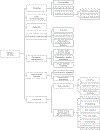Use of an expert panel to identify domains and indicators of delirium severity
- PMID: 31102155
- PMCID: PMC6858057
- DOI: 10.1007/s11136-019-02201-0
Use of an expert panel to identify domains and indicators of delirium severity
Abstract
Purpose: Our purpose was to create a content domain framework for delirium severity to inform item development for a new instrument to measure delirium severity.
Methods: We used an established, multi-stage instrument development process during which expert panelists discussed best approaches to measure delirium severity and identified related content domains. We conducted this work as part of the Better ASsessment of ILlness (BASIL) study, a prospective, observational study aimed at developing and testing measures of delirium severity. Our interdisciplinary expert panel consisted of twelve national delirium experts and four expert members of the core research group. Over a one-month period, experts participated in two rounds of review.
Results: Experts recommended that the construct of delirium severity should reflect both the phenomena and the impact of delirium to create an accurate, patient-centered instrument useful to interdisciplinary clinicians and family caregivers. Final content domains were Cognitive, Level of consciousness, Inattention, Psychiatric-Behavioral, Emotional dysregulation, Psychomotor features, and Functional. Themes debated by experts included reconciling clinical geriatrics and psychiatric content, mapping symptoms to one specific domain, and accurate capture of unclear clinical presentations.
Conclusions: We believe this work represents the first application of instrument development science to delirium. The identified content domains are inclusive of various, wide-ranging domains of delirium severity and are reflective of a consistent framework that relates delirium severity to potential clinical outcomes. Our content domain framework provides a foundation for development of delirium severity instruments that can help improve care and quality of life for patients with delirium.
Keywords: Delirium; Expert panel; Instrument development; Severity.
Conflict of interest statement
Conflict of Interest
CHB discloses consultation and a data share with Medtronic. DC discloses receiving honoraria from the Commission on Accreditation in Physical Therapy Education. DSG declares that she has no conflict of interest. EMS declares that she has no conflict of interest. TGF declares that she has no conflict of interest. SMV declares that she has no conflict of interest. ERM declares that he has no conflict of interest. JHF declares that he has no conflict of interest. AG declares that she has no conflict of interest. SG declares that she has no conflict of interest. AMK declares that she has no conflict of interest. KJN declares that she has no conflict of interest. MO declares that she has no conflict of interest. MAP declares that she has no conflict of interest. TNR declares that he has no conflict of interest. JV declares that he has no conflict of interest. HLW declares that she has no conflict of interest. RNJ declares that he has no conflict of interest. SKI declares that she has no conflict of interest.
Similar articles
-
Domains of delirium severity in Alzheimer's disease and related dementias.J Am Geriatr Soc. 2022 May;70(5):1495-1503. doi: 10.1111/jgs.17624. Epub 2021 Dec 24. J Am Geriatr Soc. 2022. PMID: 34951704 Free PMC article.
-
New Delirium Severity Indicators: Generation and Internal Validation in the Better Assessment of Illness (BASIL) Study.Dement Geriatr Cogn Disord. 2020;49(1):77-90. doi: 10.1159/000506700. Epub 2020 Jun 17. Dement Geriatr Cogn Disord. 2020. PMID: 32554974 Free PMC article.
-
Assessing Delirium Severity in Dementia: Item Development and Psychometric Validation for a Delirium Severity Instrument.J Gerontol Nurs. 2024 Sep;50(9):24-30. doi: 10.3928/00989134-20240809-06. Epub 2024 Sep 1. J Gerontol Nurs. 2024. PMID: 39194323
-
Capturing the ghost in the machine: a process for development and validation of measures of phenomenal consciousness in delirium.Age Ageing. 2024 Jul 2;53(7):afae144. doi: 10.1093/ageing/afae144. Age Ageing. 2024. PMID: 39007853 Review.
-
[Caregiver burden in relatives of persons with schizophrenia: an overview of measure instruments].Encephale. 2003 Mar-Apr;29(2):137-47. Encephale. 2003. PMID: 14567165 Review. French.
Cited by
-
Delirium Prevention, Detection, and Treatment in Emergency Medicine Settings: A Geriatric Emergency Care Applied Research (GEAR) Network Scoping Review and Consensus Statement.Acad Emerg Med. 2021 Jan;28(1):19-35. doi: 10.1111/acem.14166. Epub 2020 Dec 12. Acad Emerg Med. 2021. PMID: 33135274 Free PMC article.
-
Domains of delirium severity in Alzheimer's disease and related dementias.J Am Geriatr Soc. 2022 May;70(5):1495-1503. doi: 10.1111/jgs.17624. Epub 2021 Dec 24. J Am Geriatr Soc. 2022. PMID: 34951704 Free PMC article.
-
Psychometric Properties of a Delirium Severity Score for Older Adults and Association With Hospital and Posthospital Outcomes.JAMA Netw Open. 2022 Mar 1;5(3):e226129. doi: 10.1001/jamanetworkopen.2022.6129. JAMA Netw Open. 2022. PMID: 35357447 Free PMC article.
-
Measures for the Core Outcome Set for Research Evaluating Interventions to Prevent and/or Treat Delirium in Critically Ill Adults: An International Consensus Study (Del-COrS).Crit Care Explor. 2023 Apr 3;5(4):e0884. doi: 10.1097/CCE.0000000000000884. eCollection 2023 Apr. Crit Care Explor. 2023. PMID: 37025304 Free PMC article.
-
The CAM-ICU-7 and ICDSC as measures of delirium severity in critically ill adult patients.PLoS One. 2020 Nov 16;15(11):e0242378. doi: 10.1371/journal.pone.0242378. eCollection 2020. PLoS One. 2020. PMID: 33196655 Free PMC article.
References
-
- Flaherty JH, Morley JE (2013). Delirium in the Nursing Home; Journal of the American Medical Directors Association. 14, 632–634. - PubMed
Publication types
MeSH terms
Grants and funding
- R01 AG044518/AG/NIA NIH HHS/United States
- R03 AG061582/AG/NIA NIH HHS/United States
- K07 AG041835/AG/NIA NIH HHS/United States
- R24 AG054259/AG/NIA NIH HHS/United States
- K24AG035075/AG/NIA NIH HHS/United States
- P01 AG031720/AG/NIA NIH HHS/United States
- R01AG030618/AG/NIA NIH HHS/United States
- K01AG057836/AG/NIA NIH HHS/United States
- K24 AG035075/AG/NIA NIH HHS/United States
- R01AG044518/AG/NIA NIH HHS/United States
- K07AG041835/AG/NIA NIH HHS/United States
- K01 AG057836/AG/NIA NIH HHS/United States
- P01AG031720/AG/NIA NIH HHS/United States
- R01 AG030618/AG/NIA NIH HHS/United States
- R24AG054259/AG/NIA NIH HHS/United States
LinkOut - more resources
Full Text Sources
Medical


